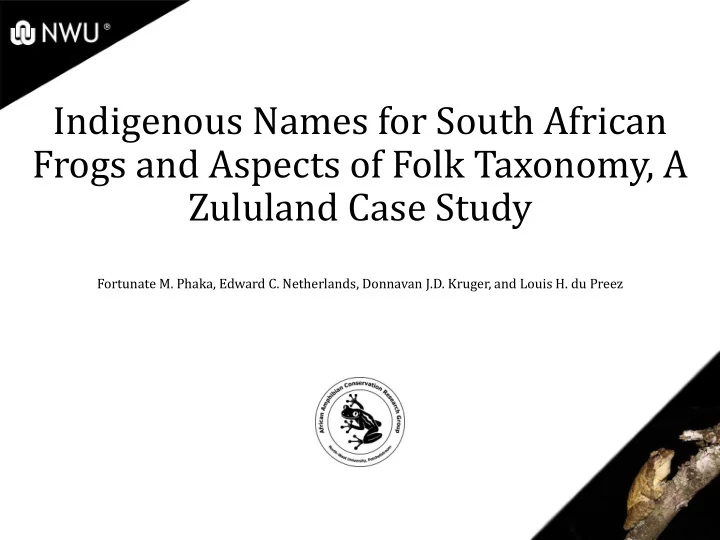

Indigenous Names for South African Frogs and Aspects of Folk Taxonomy, A Zululand Case Study Fortunate M. Phaka, Edward C. Netherlands, Donnavan J.D. Kruger, and Louis H. du Preez
Background Social element for FBIP funded project Major outcomes of that FBIP project: Two new Breviceps species described Six new amphibian and reptilian blood parasite species described (includes new genus and life cycle description) 226 amphibian DNA barcode entries to BOLD and GenBank (includes 7 new species entries to BOLD) Bilingual (isiZulu and English) frog field guide (comprehensive list of indigenous species names)
Background Bilingual (isiZulu and English) frog field guide (comprehensive list of indigenous species names)
Motivation Taxonomy allows for meaningful conversations about biota, feeds our need to organise the world into recognisable units Scientific taxonomy = standardised way of organising biota Folk taxonomy = Pre-scientific taxonomy based on culture, thus localised in application
Motivation Early collection and investigation of vernacular (Afrikaans and English) names for South African amphibians revealed a need for standardisation Today a level of standardisation has been reached for Afrikaans and English names This created a gap to reach a level of standardisation with South Africa’s other languages
Methods Semi-structured questionnaire used to collect IsiZulu frog names from Zululand locals along with reasoning behind the names
Methods Semi-structured questionnaire used to collect IsiZulu frog names from Zululand locals along with reasoning behind the names Folk taxonomy within the Zululand context investigated Classification and nomenclature principles studied and used to formulate individual isiZulu frog names Formulated names published to increase their universality
Results Six uninominal names used for frogs in Zululand No isiZulu names for individual species in Zululand species grouped according to habits, habitats or appearance
Results
Results Studied folk taxonomy guidelines supplemented with existing vernacular guidelines to formulate individual names
Discussion Folk taxonomy vs scientific taxonomy in Zululand Similar intellectualist approach Taxon ranked higher than the species group should be uninominal (ICZN Code) 32 of 58 species names were binomina (ICZN Code) Dominance of generic taxa indicates human perception of evolutionary groupings and reveals genera to be most recognizable taxonomic level A surprisingly systematic and developed taxonomy Principles show similarity across cultures
So, where to from here?
Recommend
More recommend